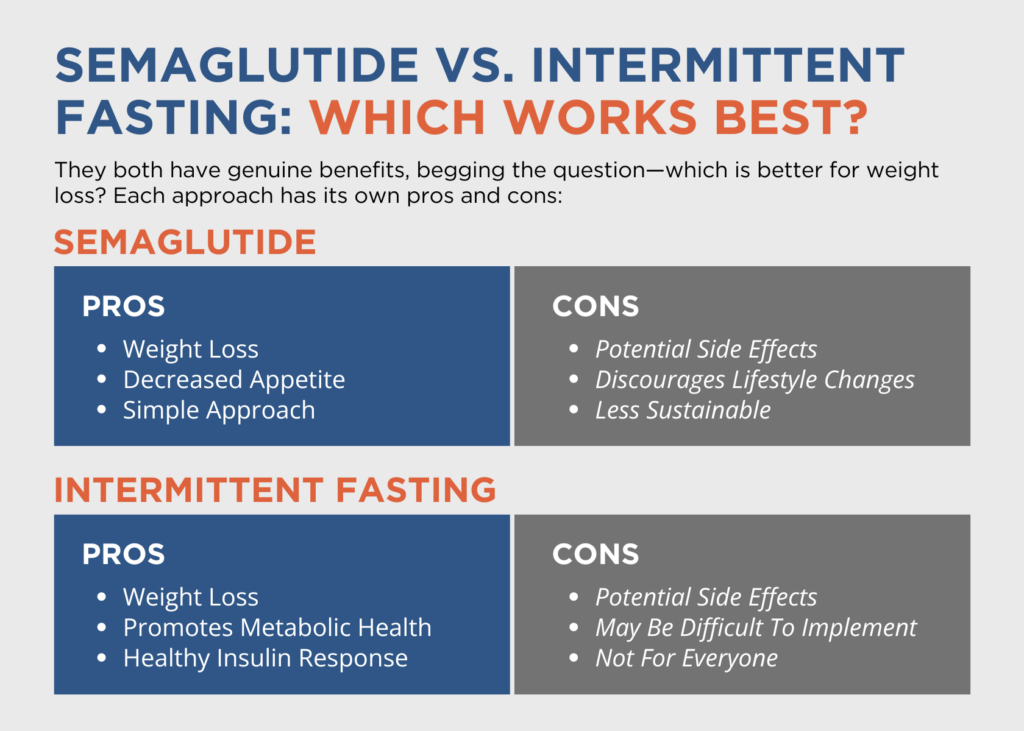What Is Semaglutide?
Semaglutide is a medication originally developed for those with type 2 diabetes. However, its benefits were found to support weight loss as well, causing it to become an active ingredient in weight loss medications.
Semaglutide is a glucagon-like peptide-1 (GLP-1) agonist, which means it mimics the hormone glucagon-like peptide 1 in the body. By doing so, it causes the release of insulin in the body. By mimicking the hormone, it also signals to your body that you’re full and slows the emptying of your stomach, reducing your appetite. This signal causes you to eat less and provides potential for weight loss in the process.
Semaglutide is the active ingredient in popular medications like Ozempic and Wegovy. Medications containing semaglutide come in pills and injection form. Patients typically receive semaglutide injections weekly, and the dosage depends on your doctor’s recommendations and how your body responds.
Benefits of Semaglutide
Semaglutide has taken the world by storm in recent years, with many people praising it as a “miracle drug” for weight loss. It’s important to be at least a little skeptical of any new trending miracle solution, but that doesn’t mean semaglutide doesn’t have its benefits.
Some of the benefits include:
- Weight loss – Research has shown semaglutide to be effective in weight loss. One study found that participants using the medication lost 15-20% of their body weight over 68 weeks when combined with a diet and exercise.
A decreased appetite – Semaglutide decreases your appetite, making you feel less hungry so that you are less likely to overindulge with food and are more likely to lose weight. - An easier approach to weight loss – Semaglutide may be an easier option for people who have struggled to achieve weight loss on their own. However, this alone has its pros and cons, as we’ll discuss.
Drawbacks of Semaglutide
Despite the potential benefits of semaglutide, it does come with several limitations. Often, these limitations mean that it’s best used as a tool alongside other lifestyle changes rather than the full answer to weight loss.
Some of the drawbacks of semaglutide include:
- Potential side effects – Semaglutide can come with a variety of possible side effects depending on the person. In mild cases, it can cause nausea, indigestion, and diarrhea. In more severe cases, side effects can include stomach paralysis, pancreatitis, thyroid problems including cancer, and gallbladder problems.
- Discourages lifestyle changes – With semaglutide, people can often lose weight without making drastic lifestyle changes, which is great for quicker and simpler weight loss but can limit your ability to maintain a healthy weight without a medication regimen and discourage important changes like healthy eating habits and physical activity.
- Lean mass loss – The goal of weight loss should be to burn as much fat as possible. Some studies have shown that semaglutide also causes the loss of lean muscle and bone mass, which can reduce your strength and slow your metabolism.
- Less sustainable – More people are becoming familiar with the term “Ozempic Rebound,” where people regain weight after they stop their semaglutide regimen. This is largely because of the lack of lifestyle changes and reliance on a medication regimen.
Experience Lasting Weight Loss Success with re:vitalize Our programs are built with sustainability in mind, empowering you with a mindset, plan, and healthy habits that bring long-term weight loss success
What Is Intermittent Fasting?
Intermittent fasting is a health and wellness approach where you set windows for reducing your calorie intake, usually only drinking water, and then eat normally outside of them. By restricting the amount of food you eat during specific windows, you encourage your body to utilize its fat stores for energy instead of calories from food.
Although it comes across as a new popular weight loss trend, the practice has been around for decades, possibly even centuries. Intermittent fasting is generally considered safe, but you should always consult your doctor before beginning a routine that includes intermittent fasting.
There are many approaches you can take to fasting, depending on what works best for your body and lifestyle. The most popular patterns include:
- Time-restricted eating – This involves fasting for a set window each day and eating normally outside that window. The most common examples include a 12-hour daily fast and a 16-hour daily fast.
- The 5:2 diet – The 5:2 diet splits up your week and involves you eating five days of the week as you normally do while reducing your calorie intake to around 500-600 on the other two days.
- Alternate-day fasting – As the name implies, the alternate-day approach follows a repeating pattern of fasting one day and eating normally the next.
- Weekly 24-hour fast – Also known as the “Eat Stop Eat” approach, this involves fasting for 24 hours straight, either once or twice a week.
- The Warrior Diet – This approach involves eating only some raw fruits and vegetables and then eating one large meal in the evening. It’s one of the first patterns to emerge as an intermittent fasting strategy, but it doesn’t have much evidence to support it as a healthy approach.
Benefits of Intermittent Fasting
It seems like intermittent fasting has become more popular in recent years, with more and more people talking about it. However, in many ways, it’s more than just another health trend. There are several benefits to including intermittent fasting in your routine, and there’s research to back it up.
The most notable benefits of intermittent fasting include:
- Research-based weight loss – Intermittent fasting is about as successful as calorie restriction for weight loss. Research has shown that it can help people lose 3% to 8% of their baseline weight.
- Promotes a healthy insulin response – Fasting gives your blood sugar a chance to stabilize in between meals, promoting insulin sensitivity and reducing insulin resistance so your body can maintain healthy blood sugar levels.
- Supports a nutritious diet – Fasting means you need more bang for your buck when you do eat, needing to get more micro and macronutrients to make you feel full and energetic throughout the day. This weight loss strategy combines well with eating nutritious whole foods, encouraging a healthier diet.
- Offers several other health benefits – In addition to weight management, research shows that intermittent fasting also offers benefits like improved memory, heart health, and enhanced physical performance.
- Promotes metabolic health – Metabolic health is a crucial part of weight loss, as your metabolism is responsible for turning food into either energy or fat, as well as burning fat for energy. By encouraging your body to use fat for energy, fasting promotes metabolic health.
- Encourages healthy, sustainable habit formation – Intermittent fasting is a lifestyle change that you can incorporate into your routine and maintain. One healthy habit often builds into more, helping you build a healthy weight management routine.
Drawbacks of Intermittent Fasting
As a natural lifestyle change, intermittent fasting can be a great strategy for many people, but that doesn’t mean it comes without any downsides. If you’re thinking about incorporating intermittent fasting into your routine, it’s important to understand the possible challenges.
Some of the potential drawbacks of intermittent fasting include:
- Potential side effects – Food is energy, so when you’re eating less, you may experience hunger and fatigue, which can lead to irritability and reduced concentration. However, many people can adjust and overcome these once they find a routine that works for them.
- May be difficult to implement – Intermittent fasting is not an easy adjustment for everyone. For some, going long periods without eating may be unrealistic, especially if you have a physically demanding job or are very active.
- Not for everyone – Fasting may be unsafe for some people with low blood pressure or heart disease or people who take certain medications. Always consult your doctor before fasting to determine whether it’s a good idea for you.

Which Is More Effective for Weight Management?
Both semaglutide and intermittent fasting have the potential to promote healthy weight management. Keep in mind, though, they do have inherent differences — intermittent fasting is a lifestyle choice, and semaglutide is a medication. Each approach will come with different pros, cons, and levels of commitment.
Ultimately, the most effective method is the one that works for you and supports your goals. If you can build a routine that fits intermittent fasting and you feel good doing it, then great! If you have tried everything to lose weight and find that semaglutide is an answer, there is no shame in that either. With either, these approaches are tools, but likely not the full solution. They ought to be incorporated into a multi-prong approach to diet and lifestyle changes that help you create sustainable results.
Some people benefit from using an approach that combines the two. If you do choose to combine these methods, make sure to stay hydrated and fill your diet with nutrient-dense whole foods in between fasts. Consult your healthcare provider for guidance on using both approaches simultaneously.
How To Maximize the Success of Semaglutide and Intermittent Fasting
Regardless of their benefits, neither of these two options are going to have their full impact if they’re not combined with a holistic approach that incorporates the right lifestyle changes. A holistic weight loss approach allows you to address the root causes of your weight gain so you stand to see better, longer-lasting results.
Important lifestyle changes include:
- Eating more fruits, vegetables, and anti-inflammatory foods
- Maintaining healthy eating habits with reasonable portion sizes
- Building a healthy mindset around food
- Adding in more physical activity
- Getting more sleep
- Incorporating stress management strategies.
- Staying accountable and sticking to a consistent routine
As with any weight loss strategy, consistency is the most crucial component. By developing a comprehensive plan and sticking to it, you’ll start to see results you can be proud of. If you need help staying accountable to your weight loss plan, you can turn to re:vitalize weight loss and wellness for support and encouragement from our board-certified nutritionists and health coaches.
Achieve Weight Loss Success with re:vitalize
Semaglutide and intermittent fasting can be helpful tools in a successful weight loss journey, but the better option depends on you and your goals. re:vitalize works with you to help you develop a weight loss plan that fits within your needs, incorporating intermittent fasting and working with you in the event you are taking semaglutide medication. Our holistic weight loss programs prioritize your unique lifestyle habits and nutritional needs to help you build a weight loss plan that is both effective and sustainable. For additional ways to make re:vitalize work for your holistic health and wellness goals, check out our virtual weight loss programs and employer weight loss programs.
Talking semaglutide or not, everyone can benefit from a holistic weight loss approach to enhance their efforts. In fact, we have many members who use these medications as tools in their weight loss journey. We’ll use biometric technology to highlight which foods and nutrients are optimal for advancing your weight loss and wellness goals even further—we’ll then provide support and accountability along the way with member resources and daily check-ins to ensure progress.
Schedule a consultation to learn more about our programs and receive a full Body Composition & Metabolic Age Analysis to understand your unique biometrics.



